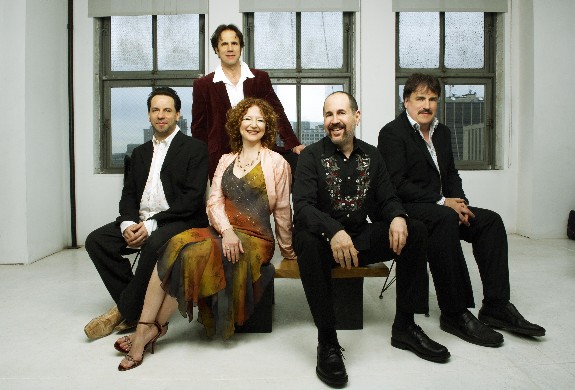Film Review: Those Cuddly and Krazy Klezmatics
The documentary The Klezmatics: On Holy Ground is pleasing to watch, but there are a number of ways of respecting as well as loving great artists, the most important being coming up with the chutzpah necessary to ask the tough questions that generate illuminating, inspiring, or interesting answers.
The Klezmatics: On Holy Ground, a documentary film directed by Erik Greenberg Anjou. Presented by the Boston Jewish Film Festival. Co-presented by the Boston Jewish Film Festival at the Museum of Fine Arts, Boston, MA, January 11–15. Also screening at the Mandell JCC of Greater Hartford, CT, March 19.
By Bill Marx
During my brief window of photogenic appeal as a child, one of my more sadistic aunts would march up to me whenever we had a family gathering and, pouncing on a quiet moment, would pinch both of my cheeks as if she was testing a melon. “What a cute face,” she would blare out, “this is a face that will make a fortune!” to my acute embarrassment and my parents unconvincing nods of pride. That sort of extreme kvelling is what I felt watching Erik Greenberg Anjou’s pleasant but friendly-to-a-fault documentary of the Klezmatics, a celebrated group now moving beyond its 25th year performing klezmer music with a radical difference.

The core Klezmatics (L-R: Frank London, Matt Darriau, Lisa Gutkin, Lorin Sklamberg, Paul Morrissett) — cheeks well worth pinching. Photo: Joshua Kessler
The band has become powerhouse by taking the music beyond memory lane, cultivating a restless creativity that combines the past with other musical traditions (gospel, jazz), concocting new, Yiddish lyrics dealing with social issues and gay pride, stretching and straining themselves and the music that they love and perform so beautifully. Anjou sits back with his camera and for about an hour and 45 minutes lovingly squeezes the cheeks of the core Klezmatics: Frank London, Lisa Gutkin, Lorin Sklamberg, Paul Morrissett, and Matt Darriau.
And what’s not to love? The Klezmatics is a megaband that has released nine albums, collaborated with the likes of Itzhak Perlman, John Zorn, Nora Guthrie, and won a Grammy Award (Best Contemporary World Music Album, 2006) for Wonder Wheel, which features previously unrecorded lyrics by Woody Guthrie. (There’s some interesting footage of the recording sessions for the album.) The film presents short excerpts of the group in action on stage (including bits of a performance with the late, great singer Adrienne Cooper), but the documentary’s major emphasis is on talking-head interviews with the band members interspersed with hosannas from relatives, fellow artists, Yiddish historians, and musicological fans.
We follow the band for three years and hear yarns about its beginnings, meet family members, and glimpse at complicated domestic lives, watch squabbles over finances, scheduling, and occasional creative differences, and witness the degradations of touring (in Wisconsin, Germany, and Poland), such as mangy hotel rooms and unprepared bookers. By the end of the film, you not only agree with the Klezmatic who characterizes the group as a dysfunctional family that, for the sake of its art, manages to keep together but that the life of the musician is also more or less dysfunctional, a risky improvisatory performance in its own right.
The latter point is not going to be much of surprise to most: the heavily underlined irony of The Klezmatics: On Holy Ground is that the group’s music may be blessed, but that its means of making a living is precarious. Members flit in and over the years (we don’t learn why), while founding drummer David Licht leaves the band to spend more time with his family and make a more consistent nine-to-five living as a housepainter. The triumph of Wonder Wheel, the recording which the group courageously financed of out of its own pockets, is sadly fleeting (Reality Check: 15 minutes of fame on NPR does not translate into lasting sales), the group’s recording company goes under, retirement and college savings are scarce, and Frank London and Lisa Gutkin clash over the inevitable pull between members making solo careers and keeping the band together.
If only Anjou had not taken the understandable but easy personal challenge/bicker route and examined the compelling cultural issues raised by the band’s music and longevity. What is the group’s attitude to a musical past that it feels free to push and pull in new directions? How much does the enthusiasm of audiences in Poland and German for klezmer come from a wish to allay guilt or feed nostalgia? What do the band members see as the relationship between klezmer music and the Holocaust? What do London and company think of other groups playing klezmer? The film treats the Klezmatics as if it is sits on a mountain top, with no influences or contextualizing competitors. Surely not everyone loves everything the group records—did the English-only lyrics of Wonder Wheel anger any of its fans?
The Klezmatics: On Holy Ground is pleasing to watch, but there are a number of ways of respecting as well as loving great artists, the most important being coming up with the chutzpah necessary to ask the tough questions that generate illuminating, inspiring, or interesting answers. Pinching cheeks only goes so far.
